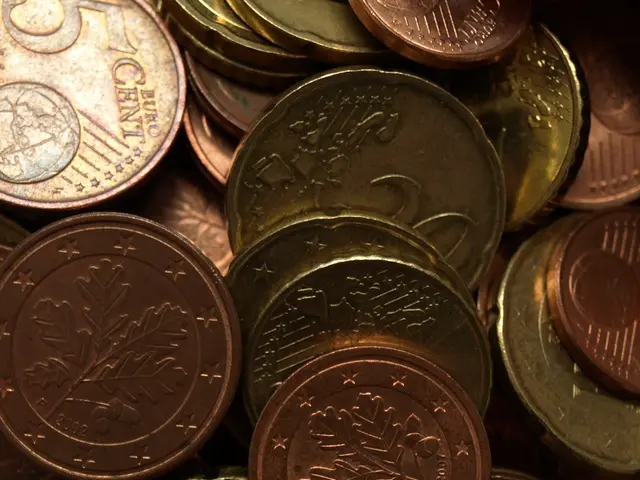Banks in South Korea to initiate collaboration on digital currency with fixed value
South Korea is making significant strides in the world of digital finance, with a focus on the development and regulation of stablecoins. As of mid-2025, the country is actively working on a comprehensive regulatory framework for stablecoins, targeting a formal rollout by late 2025 [1][2].
The Financial Services Commission (FSC) has unveiled a roadmap to legalize and regulate Korean won (KRW)-based stablecoins, alongside spot crypto ETFs, aiming to integrate these digital assets safely into the financial ecosystem. Key regulatory features include strict investor protection rules, KRW-pegged stablecoins designed for payments and remittances, and a shift towards a business-friendly, innovation-supporting environment [1][2].
The South Korean government, led by President Lee Jae-myung, is looking to create a more predictable environment for stablecoin issuers and related fintech firms. This move is expected to reduce risks associated with past restrictive or unclear policies [2]. The focus on KRW-backed stablecoins suggests a preferential market target, encouraging domestic payment and cross-border remittance innovations [1][2].
Enhanced investor protections and lower trading fees aim to attract retail participants, potentially expanding market size and liquidity. Firms entering the South Korean market must comply with new custody, pricing, and operational requirements and align with broader anti-money laundering (AML) and consumer protection standards outlined in the upcoming bills [1][2][3].
Coordination with central bank experiments, including linking stablecoins or tokenized assets with CBDC systems, indicates potential integration or coexistence with official digital currency initiatives, requiring adaptability from market participants [3].
Notably, a joint venture between Korean banks, including KB Kookmin, Shinhan, Woori, NH Nonghyup, IBK Industrial, Sh Suhyup, and Korea Financial Telecommunications & Clearing Institute (KFTC), has been formed to issue a Korean stablecoin [4]. Shinhan Bank and NH Nonghyup Bank are also participating in Project Pax, a Japanese initiative for banks to use stablecoins for cross-border payments [5].
However, the absence of Hana Bank in the joint venture and the concerns about Visa or Mastercard launching a stablecoin highlight the complexities of this emerging market [4][6]. The creation of a trustworthy 'stablecoin' ecosystem is the goal of the collaboration between banks and the Open Blockchain and DID Alliance [7].
As the stablecoin landscape evolves, it's essential to consider the broader implications. Legal clarity and regulatory support create a more predictable environment for stablecoin issuers and related fintech firms, potentially reducing risks associated with past restrictive or unclear policies [2]. The focus on KRW-backed stablecoins suggests a preferential market target encouraging domestic payment and cross-border remittance innovations [1][2].
Sources:
[1] FSC unveils roadmap for regulating stablecoins and ETFs. (2025). Yonhap News Agency. Retrieved from https://english.yonhapnews.co.kr/business/2025/06/15/0200000000AEN20250615016900315.html
[2] South Korea's stablecoin regulatory shift: A new era for fintech innovation. (2025). Ledger Insights. Retrieved from https://ledgerinsights.com/south-koreas-stablecoin-regulatory-shift-a-new-era-for-fintech-innovation/
[3] South Korea advances blockchain-based tokenized securities regulations. (2025). Cointelegraph. Retrieved from https://cointelegraph.com/news/south-korea-advances-blockchain-based-tokenized-securities-regulations
[4] Korean banks form joint venture to issue stablecoin. (2025). Reuters. Retrieved from https://www.reuters.com/business/finance/korean-banks-form-joint-venture-issue-stablecoin-2025-07-01/
[5] Shinhan Bank and NH Nonghyup Bank participate in Project Pax. (2025). The Korea Herald. Retrieved from https://www.koreaherald.com/business/finance/2025/08/03/shinhan-bank-nh-nonghyup-bank-participate-project-pax/
[6] Concerns about Visa or Mastercard launching a stablecoin. (2025). The Investor. Retrieved from https://www.theinvestor.co.kr/news/183174
[7] Stablecoin working group created by the Open Blockchain and DID Alliance. (2025). CoinDesk. Retrieved from https://www.coindesk.com/business/2025/09/10/stablecoin-working-group-created-by-the-open-blockchain-and-did-alliance/
- South Korea is developing a comprehensive regulatory framework for stablecoins, targeting a formal rollout by late 2025, focusing on investor protection rules, KRW-pegged stablecoins for payments and remittances, and creating a business-friendly environment.
- The Financial Services Commission (FSC) has proposed regulations for Korean won (KRW)-based stablecoins and spot crypto ETFs, aiming to integrate these digital assets safely into the financial ecosystem.
- The South Korean government, under President Lee Jae-myung, is looking to enhance a predictable environment for stablecoin issuers and related fintech firms to reduce risks associated with past restrictive or unclear policies.
- Firms entering the South Korean market must comply with new custody, pricing, and operational requirements, aligning with broader anti-money laundering (AML) and consumer protection standards outlined in the upcoming bills.
- Coordination with central bank experiments, such as linking stablecoins or tokenized assets with CBDC systems, indicates potential integration with official digital currency initiatives, requiring adaptability from market participants.
- A joint venture between Korean banks has been formed to issue a Korean stablecoin, and some of these banks are also participating in Project Pax, a Japanese initiative for banks to use stablecoins for cross-border payments.
- The absence of Hana Bank in the joint venture and concerns about Visa or Mastercard launching a stablecoin highlight the complexities of this emerging market, while the creation of a trustworthy 'stablecoin' ecosystem is the goal of collaborations between banks and the Open Blockchain and DID Alliance.








